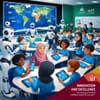The UAE is revolutionizing its education system by harnessing artificial intelligence in schools, setting a global example for innovative learning. The country has launched its first national AI curriculum for public schools, targeting nearly one million students from kindergarten to grade 12. Over 1,000 specially trained teachers will deliver the program, focusing on computing concepts, AI applications, and digital literacy.
The curriculum prioritizes AI ethics, dedicating around 25% of lessons to responsible AI use, data implications, and real-world applications. This ensures students grasp not only technical skills but also the societal and moral implications of AI. Educators are receiving extensive training in AI, supported by a structured framework that enables them to integrate AI into their daily work effectively.
The Ministry of Education is investing in modernizing schools, recruiting new teachers, and distributing laptops to enhance digital learning. Nine new schools will open, and 46,888 laptops have already been distributed to students. The UAE's approach to AI in education serves as a model globally, demonstrating how to build smart education systems that balance technology with human values.
The AI curriculum is designed to cater to different age groups, with kindergarten students introduced to AI through playful storytelling and visual engagement. As students progress, they will cover algorithmic design, AI bias, and ethical principles, ultimately exploring real-world problem-solving and advanced AI topics in higher grades.
By integrating AI into education, the UAE aims to equip students with future-ready skills, fostering a generation of technologically competent innovators capable of solving real-world challenges. This forward-thinking approach positions the UAE as a leader in AI education, inspiring other nations to follow suit and aligning with the country's Centennial 2071 vision, prioritizing innovation and advanced technology.


